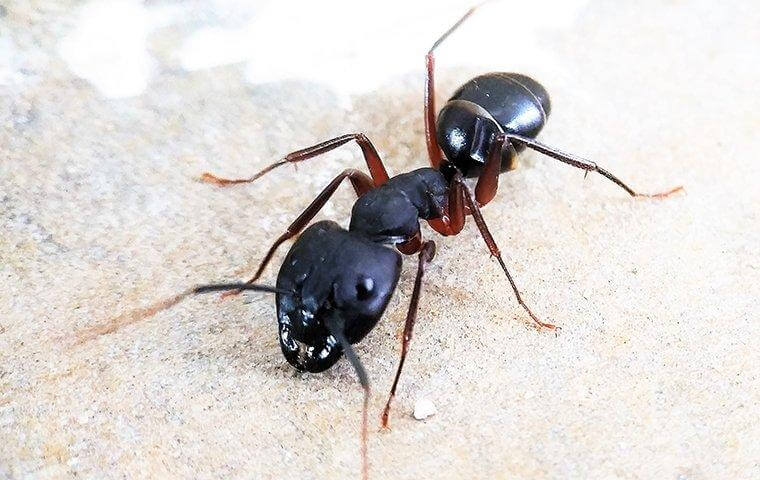 When trying to combat pests, finding out how they are getting inside your Reno home is the key. It’s not simple getting this answer, however. This is especially true if the critter in question is very small, and/or naturally dwells in a place that’s hard to reach. These factors can make it challenging to ward them off successfully, despite great cleaning techniques and purchasing retail insecticides. In fact, these elements are part of the reason why commercial items fail, and professional intervention is needed.
When trying to combat pests, finding out how they are getting inside your Reno home is the key. It’s not simple getting this answer, however. This is especially true if the critter in question is very small, and/or naturally dwells in a place that’s hard to reach. These factors can make it challenging to ward them off successfully, despite great cleaning techniques and purchasing retail insecticides. In fact, these elements are part of the reason why commercial items fail, and professional intervention is needed.
When trying to combat pests, finding out how they are getting inside your Reno home is the key. It’s not simple getting this answer, however. This is especially true if the critter in question is very small, and/or naturally dwells in a place that’s hard to reach. These factors can make it challenging to ward them off successfully, despite great cleaning techniques and purchasing retail insecticides. In fact, these elements are part of the reason why commercial items fail, and professional intervention is needed.
Ants definitely hold up in spaces that homeowners can’t easily get to. It only exacerbates things that they reproduce at a fast rate. Each subspecies of ant comes with its different risks, but all carry germs that cultivate human illnesses, and contaminate food and surfaces. Learn more about how these bugs penetrate domiciles, and how Pestmaster® Services can be of assistance.
How Do Reno Ants Get Indoors?
Carpenter, pavement, and odorous house ants are common in the area. Carpenter ants are known for being larger than most species, being 0.25 to 0.50 of an inch long. They have many shades, including reddish-black, orange, brown, yellow, red, or tan. The majority are black, though. Rather destructive, these critters rend wood with their claws. Homes and businesses are detrimentally ruined by their nesting and tunnel digging. When outside, they’ll set up shop in logs and trees. Some infestation indicators are hollow-sounding walls, and piles of wood peels around their intrusion holes.
Pavement ants vary in size, from 0.09 to 0.12 of an inch long. Their brown or black bodies feature lighter colored appendages that protrude. You’ll find them surrounding porches, and of course, driveways and sidewalks. They too do a lot of digging; it’s just in soil, instead of wood. It damages lawns. Kitchens are usually where they congregate indoors. Don’t underestimate these ants, because they can sting you.
As you might guess, odorous house ants are smelly, and target interiors. When they are crushed, they give off a spoiled coconut scent. Akin to pavement ants, these bugs are brown or black, and 0.12 of an inch long. They prefer homes, because there’s plenty of moisture, warmth, and food. They’ll gather in foundation gaps and floor voids, paneling, carpeting, pipes, and heaters. Their bites result in moderate pain. If you see one, you’ve seen them all, and have an infestation.
How Can You Prevent Reno Ants?
Ants are tough to contend with once they’re indoors. It’s best to stay on top of preventative measures from the start. To make your residence less appealing to these insects, you’ll need to reduce the possible food sources, and avenues for entry:
- Seal cracks and crevices around utility lines, doors, screens and windows, and foundations.
- All exterior doors should have sweeps attached.
- Groom your greenery regularly, and distance it two feet away from your property.
- Clean up food crumbs and spills with haste.
- Put food and garbage in canisters with airtight lids; even pet meals.
- Keep your kitchen and pantries neat.
- Vacuum and take out the trash often.
- Repair leaks and moisture problems.
What Can Pestmaster® Services Do About Ants?
The technicians at Pestmaster® Services are highly trained. They have the knowledge base to perform detailed property examinations, accurately identify ant species and their nests, and use effective treatments for extermination. Our solutions include monitoring, perimeter and exterior care, and habitat modification. Preventative options are available. Our products are plant-based and low-risk, according to regulations by the Environmental Protection Agency. It won’t be long before you're critter-free. Get a free quote when you call today!
.png)
